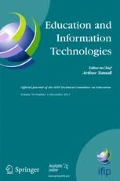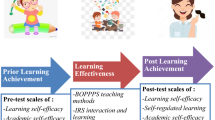Abstract
In this study, students’ interactions with different learning activities are examined and the relation among learning performance with different interaction patterns, learning performance, self-regulated learning (SRL) strategies and motivation is presented. Learning materials including different kinds of activities are prepared and presented to the use of 122 university students. As a result of the study that students spent longer time in the tutorial and video activities and they visit these activities more frequently. As a result of cluster analysis, students with the least interaction with learning activities take place in the first cluster, students who use video, example and forum activities to an intense take place in the second cluster, and students who spend more time in tutorial, exercise and concept map activities take place in the third cluster. The academic performances of students, who spend longer time in learning activities, are higher. Students in the third cluster have higher points in terms of intrinsic goal orientations, task value, control beliefs and self-efficacy for learning and performance. Finally, the results of this study show that SRL strategies differ from its sub-dimensions in terms of rehearsal, organization, elaboration, metacognitive self-regulation, time and study environment.
Similar content being viewed by others
References
Bienkowski, M., Feng, M., & Means, B. (2012). Enhancing teaching and learning through educational data mining and learning analytics: An issue brief. US Department of Education, Office of Educational Technology, 1, 1–57.
Boekaerts, M. (1999). Self-regulated learning: Where we are today. International Journal of Educational Research, 31(6), 445–557. https://doi.org/10.1016/S0883-0355(99)00014-2.
Broadbent, J. (2017). Comparing online and blended learner's self-regulated learning strategies and academic performance. The Internet and Higher Education, 33, 24–32. https://doi.org/10.1016/j.iheduc.2017.01.004.
Broadbent, J., & Poon, W. (2015). Self-regulated learning strategies & academic achievement in online higher education learning environments: A systematic review. The Internet and Higher Education, 27, 1–13. https://doi.org/10.1016/j.iheduc.2015.04.007.
Butler, D. L., & Winne, P. H. (1995). Feedback and self-regulated learning: A theoretical synthesis. Review of Educational Research, 65, 245–281. https://doi.org/10.3102/00346543065003245.
Büyüköztürk, Ş., Akgün, Ö. E., Özkahveci, Ö., & Demirel, F. (2004). Güdülenme ve öğrenme stratejileri ölçeğinin Türkçe formunun geçerlik ve güvenirlik çalışması [the validity and reliability study of the Turkish version of the motivated strategies for learning questionnaire]. Kuram ve Uygulamada Eğitim Bilimleri [Educational Sciences: Theory & Practice], 4(2), 207–239.
Cerezo, R., Sánchez-Santillán, M., Paule-Ruiz, M. P., & Núñez, J. C. (2016). Students' LMS interaction patterns and their relationship with achievement: A case study in higher education. Computers & Education, 96, 42–54. https://doi.org/10.1016/j.compedu.2016.02.006.
Cho, M.-H., Kim, Y., & Choi, D. (2017). The effect of self-regulated learning on college students’ perceptions of community of inquiry and affective outcomes in online learning. The Internet and Higher Education, 34, 10–17. https://doi.org/10.1016/j.iheduc.2017.04.001.
Cook, D. A., & Artino, A. R. (2016). Motivation to learn: An overview of contemporary theories. Medical Education, 50(10), 997–1014. https://doi.org/10.1111/medu.13074.
Dabbagh, N., & Kitsantas, A. (2013). Using learning management systems as metacognitive tools to support self-regulation in higher education contexts. In International handbook of metacognition and learning technologies (pp. 197–211). Springer, New York, NY.
de Barba, P. G., Kennedy, G. E., & Ainley, M. D. (2016). The role of students' motivation and participation in predicting performance in a MOOC. Journal of Computer Assisted Learning, 32(3), 218–231. https://doi.org/10.1111/jcal.12130.
Effeney, G., Carroll, A., & Bahr, N. (2013). Self-regulated learning: Key strategies and their sources in a sample of adolescent males. Australian Journal of Educational & Developmental Psychology, 13, 58–74.
Giesbers, B., Rienties, B., Tempelaar, D., & Gijselaers, W. (2013). Investigating the relations between motivation, tool use, participation, and performance in an e-learning course using web-videoconferencing. Computers in Human Behavior, 29(1), 285–292. https://doi.org/10.1016/j.chb.2012.09.005.
Giesbers, B., Rienties, B., Tempelaar, D., & Gijselaers, W. (2014). A dynamic analysis of the interplay between asynchronous and synchronous communication in online learning: The impact of motivation. Journal of Computer Assisted Learning, 30(1), 30–50. https://doi.org/10.1111/jcal.12020.
Hair, J. F., Black, W. C., Babin, B. J., & Anderson, R. E. (2010). Multivariate data analysis (7th ed.). NY: Prentice Hall.
Hartnett, M. (2016). Motivation in online education. Singapore: Springer.
Hellas, A., Ihantola, P., Petersen, A., Ajanovski, V. V., Gutica, M., Hynninen, T., & Liao, S. N. (2018). Predicting academic performance: a systematic literature review. In Proceedings Companion of the 23rd Annual ACM Conference on Innovation and Technology in Computer Science Education (pp. 175–199). ACM.
Jo, I. H., Yu, T., Lee, H., & Kim, Y. (2015). Relations between student online learning behavior and academic achievement in higher education: A learning analytics approach. In Emerging issues in smart learning (pp. 275–287). Springer, Berlin, Heidelberg.
Jo, I. H., Park, Y., Yoon, M., & Sung, H. (2016). Evaluation of online log variables that estimate learners’ time Management in a Korean Online Learning Context. The International Review of Research in Open and Distributed Learning, 17(1), 195–213. https://doi.org/10.19173/irrodl.v17i1.2176.
Kitsantas, A., Robert, A. R., & Doster, J. (2004). Developing self-regulated learners: Goal setting, self-evaluation, and organizational signals during acquisition of procedural skills. The Journal of Experimental Education, 72(4), 269–287. https://doi.org/10.3200/JEXE.72.4.269-287.
Kizilcec, R. F., Pérez-Sanagustín, M., & Maldonado, J. J. (2017). Self-regulated learning strategies predict learner behavior and goal attainment in massive open online courses. Computers & Education, 104, 18–33. https://doi.org/10.1016/j.compedu.2016.10.001.
Li, L. Y., & Tsai, C. C. (2017). Accessing online learning material: Quantitative behavior patterns and their effects on motivation and learning performance. Computers & Education, 114, 286–297. https://doi.org/10.1016/j.compedu.2017.07.007.
Lust, G., Vandewaetere, M., Ceulemans, E., Elen, J., & Clarebout, G. (2011). Tool-use in a blended undergraduate course: In search of user profiles. Computers & Education, 57(3), 2135–2144. https://doi.org/10.1016/j.compedu.2011.05.010.
Lust, G., Collazo, N. A. J., Elen, J., & Clarebout, G. (2012). Content management systems: Enriched learning opportunities for all? Computers in Human Behavior, 28(3), 795–808. https://doi.org/10.1016/j.chb.2011.12.009.
Lust, G., Elen, J., & Clarebout, G. (2013). Students’ tool-use within a web enhanced course: Explanatory mechanisms of students’ tool-use pattern. Computers in Human Behavior, 29(5), 2013–2021. https://doi.org/10.1016/j.chb.2013.03.014.
Macfadyen, L. P., & Dawson, S. (2010). Mining LMS data to develop an “early warning system” for educators: A proof of concept. Computers & Education, 54(2), 588–599. https://doi.org/10.1016/j.compedu.2009.09.008.
Macfadyen, L. P., & Dawson, S. (2012). Numbers are not enough. Why e-learning analytics failed to inform an institutional strategic plan. Educational Technology & Society, 15(3), 149–163 Retrieved from http://www.jstor.org/stable/jeductechsoci.15.3.149.
Pintrich, P. R. (2000). The role of goal orientation in self-regulated learning. In M. Boekaerts, P. Pintrich, & M. Zeidner (Eds.), Handbook of self-regulation (pp. 451–502). San Diego: Academic.
Pintrich, P. R., & Schunk, D. H. (2002). Motivation in education: Theory, research, and applications. Prentice Hall.
Pintrich, P. R., Smith, D. A., Garcia, T., & McKeachie, W. J. (1991). A manual for the use of the motivated strategies for learning questionnaire (MSLQ). Ann Arbor, MI: The University of Michigan.
Pintrich, P. R., Smith, D. A., Garcia, T., & McKeachie, W. J. (1993). Reliability and predictive validity of the motivated strategies for learning questionnaire (MSLQ). Educational and Psychological Measurement, 53(3), 801–813. https://doi.org/10.1177/0013164493053003024.
Recker, M., & Lee, J. E. (2016). Analyzing learner and instructor interactions within learning management systems: Approaches and examples. Learning, Design, and Technology: An International Compendium of Theory, Research, Practice, and Policy, 1-23. https://doi.org/10.1007/978-3-319-17727-4_7-1.
Renkl, A. (2002). Worked-out examples: Instructional explanations support learning by self-explanations. Learning and Instruction, 12(5), 529–556. https://doi.org/10.1016/S0959-4752(01)00030-5.
Schunk, D. H., Meece, J. L., & Pintrich, P. R. (2014). Motivation in education: Theory, research, and applications (4th ed.). Boston, MA: Pearson.
Shapiro, H. B., Lee, C. H., Roth, N. E. W., Li, K., Çetinkaya-Rundel, M., & Canelas, D. A. (2017). Understanding the massive open online course (MOOC) student experience: An examination of attitudes, motivations, and barriers. Computers & Education, 110, 35–50. https://doi.org/10.1016/j.compedu.2017.03.003.
Silber, K. H., & Foshay, W. R. (2006). Designing instructional strategies: A cognitive perspective. In J. A. Pershing (Ed.), Handbook of human performance technology (3rd ed., pp. 370–413). San Francisco: Pfeiffer.
Şahin, M., Keskin, S., Özgür, A., & Yurdugül, H. (2017). E-Öğrenme ortamlarında öğrenen özelliklerine dayalı etkileşim profillerinin belirlenmesi [determination of interaction profiles based on learner characteristics in e-learning environment]. Eğitim Teknolojisi Kuram ve Uygulama [Educational Technology Theory and Practice], 7(2), 172–192. https://doi.org/10.17943/etku.297075.
Tsai, Y. H., Lin, C. H., Hong, J. C., & Tai, K. H. (2018). The effects of metacognition on online learning interest and continuance to learn with MOOCs. Computers & Education, 121, 18–29. https://doi.org/10.1016/j.compedu.2018.02.011.
Tseng, H., Yi, X., & Yeh, H. T. (2019). Learning-related soft skills among online business students in higher education: Grade level and managerial role differences in self-regulation, motivation, and social skill. Computers in Human Behavior, 95, 179–186. https://doi.org/10.1016/j.chb.2018.11.035.
Winne, P. H., & Hadwin, A. F. (1998). Studying as self-regulated learning. In D. J. Hacker & J. Dunlosky (Eds.), Metacognition in educational theory and practice, the educational psychology series. Mahwah, NJ: Erlbaum.
Wolters, C. A., Pintrich, P. R., & Karabenick, S. A. (2005). Assessing academic self-regulated learning. In What do children need to flourish? (pp. 251–270). Springer, Boston, MA.
Wong, J., Baars, M., Davis, D., van der Zee, T., Houben, G. J., & Paas, F. (2019). Supporting self-regulated learning in online learning environments and MOOCs: A systematic review. International Journal of Human–Computer Interaction, 35(4–5), 356–373. https://doi.org/10.1080/10447318.2018.1543084.
You, J. W. (2016). Identifying significant indicators using LMS data to predict course achievement in online learning. The Internet and Higher Education, 29, 23–30. https://doi.org/10.1016/j.iheduc.2015.11.003.
Yu, T., & Jo, I. H. (2014). Educational technology approach toward learning analytics: Relationship between student online behavior and learning performance in higher education. In Proceedings of the Fourth International Conference on Learning Analytics and Knowledge (pp. 269-270). ACM.
Yukselturk, E. (2010). An investigation of factors affecting student participation level in an online discussion forum. Turkish Online Journal of Educational Technology-TOJET, 9(2), 24–32 Retrieved from https://files.eric.ed.gov/fulltext/EJ897999.pdf.
Zimmerman, B. J. (2000). Attaining self-regulation: A social cognitive perspective. In M. Boekaerts, P. R. Pintrich, & M. Zeidner (Eds.), Handbook of self-regulation (pp. 13–39). San Diego, USA: Academic.
Acknowledgements
Preliminary findings of the study were presented as an abstract at 12th International Computer and Instructional Technologies Symposium (ICITS 2018).
Author information
Authors and Affiliations
Corresponding author
Additional information
Publisher’s note
Springer Nature remains neutral with regard to jurisdictional claims in published maps and institutional affiliations.
Rights and permissions
About this article
Cite this article
Çebi, A., Güyer, T. Students’ interaction patterns in different online learning activities and their relationship with motivation, self-regulated learning strategy and learning performance. Educ Inf Technol 25, 3975–3993 (2020). https://doi.org/10.1007/s10639-020-10151-1
Received:
Accepted:
Published:
Issue Date:
DOI: https://doi.org/10.1007/s10639-020-10151-1




